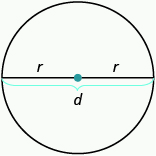Using the Properties of Circles to Solve Problems
Learning Outcomes
- Find the circumference and area of a circular object given it's radius
- Find the circumference and area of a circular object given it's diameter
- Calculate the diameter of a circular object given it's circumference
Do you remember the properties of circles from Decimals and Fractions Together? We’ll show them here again to refer to as we use them to solve applications.
Properties of Circles

- [latex]r[/latex] is the length of the radius
- [latex]d[/latex] is the length of the diameter
- [latex]d=2r[/latex]
- Circumference is the perimeter of a circle. The formula for circumference is[latex]C=2\pi r[/latex]
- The formula for area of a circle is[latex]A=\pi {r}^{2}[/latex]
example
A circular sandbox has a radius of [latex]2.5[/latex] feet. Find the 1. circumference and 2. area of the sandbox. Solution| 1. Step 1. Read the problem. Draw the figure and label it with the given information. |  |
| Step 2. Identify what you are looking for. | the circumference of the circle |
| Step 3. Name. Choose a variable to represent it. | Let c = circumference of the circle |
| Step 4. Translate. Write the appropriate formula Substitute | [latex]C=2\pi r[/latex] [latex]C=2\pi \left(2.5\right)[/latex] |
| Step 5. Solve the equation. | [latex]C\approx 2\left(3.14\right)\left(2.5\right)[/latex] [latex]C\approx 15\text{ft}[/latex] |
Step 6. Check. Does this answer make sense?
Yes. If we draw a square around the circle, its sides would be [latex]5[/latex] ft (twice the radius), so its perimeter would be [latex]20[/latex] ft. This is slightly more than the circle's circumference, [latex]15.7[/latex] ft.
 |
|
| Step 7. Answer the question. | The circumference of the sandbox is [latex]15.7[/latex] feet. |
| 2. Step 1. Read the problem. Draw the figure and label it with the given information. |  |
| Step 2. Identify what you are looking for. | the area of the circle |
| Step 3. Name. Choose a variable to represent it. | Let A = the area of the circle |
| Step 4. Translate. Write the appropriate formula Substitute | [latex]A=\pi {r}^{2}[/latex] [latex]A=\pi{\left(2.5\right)}^{2}[/latex] |
| Step 5. Solve the equation. | [latex]A\approx \left(3.14\right){\left(2.5\right)}^{2}[/latex] [latex]A\approx 19.625\text{sq. ft}[/latex] |
| Step 6. Check. Yes. If we draw a square around the circle, its sides would be [latex]5[/latex] ft, as shown in part ⓐ. So the area of the square would be [latex]25[/latex] sq. ft. This is slightly more than the circle's area, [latex]19.625[/latex] sq. ft. | |
| Step 7. Answer the question. | The area of the circle is [latex]19.625[/latex] square feet. |
try it
[ohm_question]146563[/ohm_question] [ohm_question]146564[/ohm_question]example
A circular table has a diameter of four feet. What is the circumference of the table?Answer: Solution
| Step 1. Read the problem. Draw the figure and label it with the given information. |  |
| Step 2. Identify what you are looking for. | the circumference of the table |
| Step 3. Name. Choose a variable to represent it. | Let c = the circumference of the table |
| Step 4. Translate. Write the appropriate formula for the situation. Substitute. | [latex]C=\pi d[/latex] [latex]C=\pi \left(4\right)[/latex] |
| Step 5. Solve the equation, using [latex]3.14[/latex] for [latex]\pi [/latex]. | [latex]C\approx \left(3.14\right)\left(4\right)[/latex] [latex]C\approx 12.56\text{feet}[/latex] |
Step 6. Check: If we put a square around the circle, its side would be [latex]4[/latex].
The perimeter would be [latex]16[/latex]. It makes sense that the circumference of the circle, [latex]12.56[/latex], is a little less than [latex]16[/latex].
 |
|
| Step 7. Answer the question. | The diameter of the table is [latex]12.56[/latex] square feet. |
try it
[ohm_question]146785[/ohm_question] [ohm_question]146786[/ohm_question]example
Find the diameter of a circle with a circumference of [latex]47.1[/latex] centimeters.Answer: Solution
| Step 1. Read the problem. Draw the figure and label it with the given information. |  [latex]C=47.1[/latex]cm
[latex]C=47.1[/latex]cm |
| Step 2. Identify what you are looking for. | the diameter of the circle |
| Step 3. Name. Choose a variable to represent it. | Let [latex]d[/latex] = the diameter of the circle |
| Step 4. Translate. | |
| Write the formula. Substitute, using [latex]3.14[/latex] to approximate [latex]\pi [/latex] . | [latex]C=\pi{d}[/latex] [latex]47.1\approx{3.14d}[/latex] |
| Step 5. Solve. | [latex]\frac{47.1}{3.14}\approx\frac{3.14d}{3.14}[/latex] [latex]15\approx{d}[/latex] |
| Step 6. Check: [latex]C=\pi{d}[/latex] [latex-display]47.1\stackrel{?}{=}\left(3.14\right)\left(15\right)[/latex-display] [latex]47.1=47.1\quad\checkmark [/latex] | |
| Step 7. Answer the question. | The diameter of the circle is approximately [latex]15[/latex] centimeters. |
try it
[ohm_question]146787[/ohm_question]Licenses & Attributions
CC licensed content, Original
- Question ID 146787, 146786, 146785. Authored by: Lumen Learning. License: CC BY: Attribution.
CC licensed content, Specific attribution
- Prealgebra. Provided by: OpenStax License: CC BY: Attribution. License terms: Download for free at http://cnx.org/contents/[email protected].
